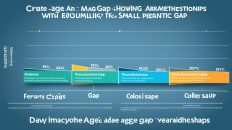Have you ever wondered what the “right” age gap is in a romantic relationship? It’s a question that has crossed many minds, including mine. When I first met my partner, who is several years older than me, I couldn’t help but ponder if our age difference would be a stumbling block or a source of strength in our relationship. The truth is, age gaps in relationships are more common than we think, and they come with their own set of dynamics, challenges, and rewards.
- Age gaps in relationships are not uncommon, with famous couples like George and Amal Clooney showing that love transcends age.
- The average age gap in heterosexual relationships is around 2.3 years, but there are couples with age gaps of 10 years or more.
- Age gaps can affect various aspects of a relationship, including energy levels, retirement plans, and decision-making about children.
- Successful age-gap relationships require open communication, compromise, and a shared vision for the future.
- While age gaps may present challenges, they do not determine the success or failure of a relationship.
Can Age Gaps Affect Relationships?
Age gaps in relationships can have an influence on various aspects of the partnership. Differences in energy levels, decisions about having children, blending families, and financial disparities can create tension. Retirement can also pose challenges for couples with significant age gaps, as one partner may be ready to retire while the other is still working.
Age difference does not guarantee relationship failure. With open communication, respect, and mutual support, age gaps can lead to fulfilling and satisfying partnerships.
Research suggests that older women paired with younger men generally report higher levels of satisfaction with their marriages. This may be attributed to factors such as increased vitality and a shared sense of adventure. However, every relationship is unique, and individual experiences may vary.
To navigate the challenges that may arise due to age gaps, it is crucial for couples to communicate effectively and make compromises. This involves actively listening to each other’s concerns, finding common ground, and prioritizing the well-being of the relationship as a whole.
The Acceptable Age Difference in Couples
While there is no definitive formula for an acceptable age difference in couples, society’s perception of an ideal age gap has evolved over time. Relationships with moderate age gaps tend to face comparatively less social disapproval. A study conducted by researchers at Emory University found that couples with an age difference of one to three years are more likely to have successful and long-lasting relationships.
It is important to note that age is just one factor among many that contribute to the strength and compatibility of a relationship. Shared values, effective communication, mutual respect, and emotional compatibility play vital roles.
| Aspect | Impact on Relationships |
|---|---|
| Energy Levels | Differences in energy levels may affect the couple’s ability to engage in shared activities and spend quality time together. |
| Decisions about Having Children | Couples with significant age gaps may need to consider fertility as a factor in their family planning. The desire to start a family and the biological feasibility of doing so may differ between partners. |
| Blending Families | Age gaps can present unique challenges when blending families, particularly when there are children from previous relationships involved. Differences in parenting styles and generational gaps may require sensitive navigation. |
| Financial Disparities | A significant age difference in couples may lead to variations in financial situations and goals. One partner may be closer to retirement, while the other is still in the prime of their career. Decision-making regarding finances and long-term financial planning may require additional consideration. |
Do Big Age Gaps in Relationships Work?
Age gaps in relationships can be successful if the couple shares a compatible value system and is willing to communicate and make compromises. However, achieving a successful partnership requires navigating various challenges, such as differences in fertility concerns, retirement plans, and health issues related to aging. Establishing long-term goals and openly discussing important topics, such as whether to have children, financial matters, and providing support throughout different life stages, is crucial.
Building a strong foundation of trust, communication, and respect is key to making age-gap relationships thrive. It is important for both partners to feel heard, understood, and supported in their individual needs and desires. By openly addressing potential challenges and creating a shared vision for the future, couples can ensure that their age difference becomes an asset rather than a barrier to a fulfilling and successful relationship.
Navigating Differences in Age-Gap Relationships
Age gaps can introduce unique dynamics into a relationship. Here are some strategies for overcoming common challenges:
- 1. Fertility Concerns: If starting a family is a shared goal, couples should have open conversations about fertility options and potential challenges related to age.
- 2. Retirement Plans: Discuss retirement goals and ensure both partners are on the same page regarding timelines and financial preparations.
- 3. Health Issues: Aging can come with specific health concerns. It is important to address potential health issues early on and be prepared to provide support and adapt to changing circumstances.
Quotes from Couples in Age-Gap Relationships
“Despite our age difference, we respect each other’s perspectives and make decisions together. It’s about understanding one another and finding common ground.”
“Communication is key in any relationship, but especially in age-gap relationships. We make sure to have open conversations about our needs, fears, and desires. It helps us navigate any challenges that arise.”
Comparing Relationship Age Gap Standards
| Age Difference | Relationship Type | Percentage |
|---|---|---|
| 10 years or more | Male-Female | 8% |
| 10 years or more | Male-Male | 25% |
| 10 years or more | Female-Female | 15% |
While these statistics provide a general understanding of age gap preferences, it is important to remember that each relationship is unique and should be evaluated based on the individual circumstances and compatibility of the partners involved.
Minding the Gap
When it comes to age differences in relationships, it’s important for couples to navigate the challenges and make the most of their unique situation. By establishing what they value in their relationship and having open discussions about their long-term goals, couples can successfully navigate the average age gap in romantic relationships. Considerations such as retirement plans, work-life balance, and willingness to have children play an important role in the dynamics of a relationship with significant age differences.
Addressing potential age-related health issues early on is also crucial for couples to ensure their well-being. By being proactive and prepared to adapt to changing dynamics, couples can effectively manage any challenges that may arise due to age gaps. Seeking professional counseling or guidance from a support network can provide additional resources and tools to help couples thrive in their relationship.
| Factors to consider for couples with significant age differences: |
|---|
| Retirement plans |
| Work-life balance |
| Willingness to have children |
| Addressing age-related health issues |
| Adapting to changing dynamics |
| Seeking professional counseling or support |
In conclusion, couples with significant age differences can foster a healthy and fulfilling relationship by acknowledging and addressing the unique challenges they may face. By focusing on effective communication, mutual respect, and shared goals, couples can overcome any obstacles presented by the average age gap in romantic relationships.

How to Make Age-Gap-Related Issues Work
In age-gap relationships, overcoming challenges requires setting boundaries and open communication. By addressing potential issues head-on, couples can create a strong foundation for a healthy and fulfilling partnership. Here are some key strategies for navigating age-gap-related concerns:
- Discuss Financial Goals: It’s crucial for couples to have open conversations about their financial aspirations, including retirement plans and budgeting for the future. Aligning financial goals can help mitigate potential conflicts over money matters.
- Bond as a Family: Finding quality time to bond as a family is essential in age-gap relationships. Engaging in shared activities, creating new traditions, and building a sense of togetherness can strengthen the connection between partners, regardless of their age difference.
- Avoid Parental Roles: It’s important for both partners to avoid falling into parental roles based on the age gap. Each partner should be free to express their individuality and maintain their autonomy within the relationship.
- Embrace Curiosity: Being genuinely interested in each other’s experiences and perspectives can deepen the connection between partners. Taking the time to understand and appreciate the unique qualities that each person brings to the relationship fosters a sense of mutual respect and growth.
- Respect and Listen: Building a strong foundation of respect and active listening is vital in age-gap relationships. Both partners should prioritize understanding and validating each other’s needs, ensuring that communication flows smoothly and conflicts can be resolved effectively.
By implementing these strategies, couples can navigate age-gap-related challenges and build a strong, healthy, and fulfilling love relationship.
Emotional maturity
Age gaps in relationships can sometimes result in different levels of emotional maturity. Couples with significant age differences may have vastly different life experiences, which can impact their ability to relate to each other emotionally. The partner who is more mature may end up carrying a heavier emotional load in the relationship, leading to exhaustion and potential relationship challenges. It is important for couples to understand and address these dynamics and ensure both partners feel supported and understood.
| Age difference | Emotional dynamics | Effect on the relationship |
|---|---|---|
| Small age gap | Similar life experiences and emotional maturity | Less emotional strain, better understanding |
| Large age gap | Differences in life experiences and emotional maturity | Potential emotional burden on the more mature partner, relationship challenges |
“Having a significant age difference in a relationship can create unique emotional challenges. It’s important for both partners to recognize and address these differences in order to maintain a healthy and fulfilling connection.” – Relationship expert, Dr. Jane Miller
To overcome emotional challenges in age-gap relationships, couples can:
- Practice active listening and empathy
- Seek couples therapy or counseling, if necessary
- Communicate openly and honestly about emotions and needs
- Establish boundaries and expectations
By acknowledging and addressing the emotional dynamics in their relationship, couples can foster greater understanding and create a supportive and fulfilling connection.
Supporting each other's emotional needs
In age-gap relationships, it’s important for both partners to feel supported and understood emotionally. The partner who is more mature may have to navigate the emotional challenges of the younger partner, while also receiving support and understanding from their partner. Open and compassionate communication is key to ensuring that both partners feel emotionally validated and cared for.
By prioritizing emotional well-being and actively working on understanding each other’s emotional needs, age-gap couples can build a strong and resilient foundation for their relationship.
Priorities
Couples with significant age gaps often face challenges due to differences in priorities. These variations can include disparities in health, energy levels, life goals, and plans for starting a family. To ensure long-term compatibility, it is crucial for couples to have open and honest discussions about their priorities and hopes for the future. These conversations should cover a range of topics, such as work-life balance, leisure activities, and expectations regarding children.
Age difference in couples can give rise to differing perspectives and needs. Addressing these differences head-on can help couples navigate potential conflicts and find meaningful ways to align their priorities.
By understanding and respecting each other’s priorities, couples can work together to find common ground and make decisions that benefit both partners. Finding a balance between individual aspirations and shared goals is essential for building a strong and fulfilling relationship.
| Priorities | Suggestions |
|---|---|
| Health | Discuss lifestyle choices, medical concerns, and support each other’s well-being. Explore ways to stay active and maintain a healthy lifestyle. |
| Work-life balance | Find ways to support each other’s career aspirations and create a harmonious balance between work and personal life. Discuss expectations and desired levels of involvement. |
| Leisure activities | Discover shared interests and explore new hobbies together. Respect each other’s individual preferences and create opportunities for both partners to engage in activities they enjoy. |
| Family planning | Have open and honest conversations about desires for children and the timing of starting a family. Consider factors such as age, fertility, and the practicalities involved in raising children. |
By actively addressing the differences in priorities, couples can strengthen their bond, build mutual understanding, and navigate the complexities that may arise from their age difference, ultimately creating a relationship that thrives.

End-of-life concerns
In relationships with significant age gaps, there may be legitimate concerns about the older partner’s longevity and the impact it may have on the relationship. The younger partner might worry about being left alone when the older partner passes away, facing the prospects of navigating life without their companion.
While these concerns are understandable, open and honest communication is crucial to address them effectively. By discussing end-of-life care, financial arrangements, and emotional support systems, couples can alleviate anxieties and create a plan to ensure that both partners feel supported and prepared.
“Open communication about end-of-life concerns can help couples face this challenging aspect of age-gap relationships together, showing each other the love and support needed during difficult times.” – Dr. Emily Johnson, Relationship Therapist
Having conversations about end-of-life care involves discussing practical matters such as wills, power of attorney, and advance healthcare directives. By addressing these topics in advance, couples can establish a sense of security and ensure that their wishes are known and respected.
Financial arrangements are another crucial aspect to consider. It’s important to discuss how to handle finances in the event of one partner’s passing and to ensure that the surviving partner will be financially secure. This may involve reviewing insurance policies, retirement plans, and considering any necessary adjustments to estate planning.
Emotional support plays a significant role during end-of-life concerns. Talking openly about fears, insecurities, and hopes can foster a deeper connection and understanding between partners. It is essential to create an environment where both partners feel safe expressing their emotions and can provide comfort and reassurance to each other.
Support Systems
Building a support network outside the relationship can be beneficial for partners in age-gap relationships. Friends, family members, or support groups can provide additional emotional support during difficult times. Seeking professional counseling or therapy can also offer valuable guidance and assistance in navigating end-of-life concerns.
| Key Considerations for End-of-Life Planning | Actions to Take |
|---|---|
| Discussing end-of-life care preferences | Honestly express wishes, create advance directives, and choose a healthcare proxy |
| Reviewing financial arrangements | Ensure wills, insurance policies, and retirement plans are up to date |
| Nurturing emotional support | Encourage open conversations, seek professional counseling if needed, and establish a strong support system |
“By proactively addressing end-of-life concerns and putting plans in place, couples can strengthen their bond and face the future with greater peace of mind.” – Dr. Sarah Thompson, Marriage and Family Therapist
Why doesn't age matter to some?
Age gaps in relationships have long been a topic of fascination and speculation. While some people view age differences as a potential challenge, others find that it brings unique advantages and adds vitality to their relationships. So why doesn’t age matter to some couples? Let’s explore the factors that contribute to the success of age gap relationships.
Evolutionary Factors: Attractiveness and Vitality
An evolutionary perspective suggests that men are often attracted to younger women due to specific indicators of fertility and vitality. On the other hand, women may value older men for their established status and access to resources. These innate biological preferences are thought to be shaped by the desire to ensure reproductive success.
Socio-Cultural Influences: Changing Dynamics
“Age-gap relationships defy societal norms and challenge conventional expectations, making them all the more exciting and fulfilling.”
While evolutionary factors play a role, socio-cultural influences also shape preferences in age-gap relationships. With changing gender dynamics and greater opportunities available to women, traditional expectations have evolved. Many individuals now have the freedom to choose partners based on shared values, emotional connection, and compatibility rather than solely on age.
Relationship Satisfaction and Commitment
Research suggests that age-gap couples often report higher levels of relationship satisfaction, trust, and commitment compared to their peers in similar-aged relationships. The mutual understanding, emotional support, and shared experiences that come with age disparities contribute to the overall strength of these partnerships.
The Impact of Social Disapproval
Despite the positive aspects of age gap relationships, the perception of social disapproval can create challenges. External judgment and societal stigma may cause some couples to face criticism and doubt. However, it is important to remember that age itself does not determine the success or failure of a relationship.
Age gap couples who have a strong foundation built on mutual respect, effective communication, and shared goals can overcome the hurdles that social disapproval presents. By focusing on their own happiness and well-being, these couples can navigate any obstacles that may arise and continue to thrive in their relationship.
In conclusion, age gaps in relationships can lead to rewarding partnerships that defy societal expectations. While evolutionary factors and socio-cultural influences shape preferences, it’s ultimately the strength of the connection, emotional compatibility, and shared values that determine the success of age gap couples. By embracing their unique dynamics and prioritizing their relationship, these couples can create lasting bonds filled with love, respect, and vitality.
What are the relationship outcomes for age-gap couples?
Studies indicate that age-gap couples can maintain satisfying romantic relationships, with higher levels of trust and commitment compared to similar-aged couples. While age gaps may present additional challenges, they can be overcome through open communication and mutual support.
Factors such as shared values, goals, communication skills, and emotional intelligence play a significant role in relationship success for age-gap couples. Building a strong foundation of trust and understanding can help navigate the potential hurdles that arise due to the age difference.
The perception of social disapproval can negatively affect relationship commitment, but it is not an inherent factor in age-gap relationships. By focusing on their own happiness and prioritizing their bond, age-gap couples can overcome societal judgment and thrive in their relationship.
“Love knows no age” – Elizabeth Taylor
Age-gap couples who are committed to their relationship and invested in each other’s growth and well-being can achieve long-term satisfaction. The key is to embrace open communication, address any issues that may arise, and foster a supportive and loving environment.
Factors Influencing Relationship Outcomes for Age-Gap Couples
| Factors | Impact on Relationship |
|---|---|
| Shared values | Enhances understanding and compatibility |
| Goals and aspirations | Aligning visions for the future |
| Communication skills | Facilitating effective expression and resolution of concerns |
| Emotional intelligence | Empathy, understanding, and support |
In age-gap relationships, it is crucial to establish a strong foundation of trust, respect, and communication. By nurturing these qualities and focusing on shared values and goals, age-gap couples can achieve fulfilling and satisfying relationships, defying societal norms and expectations.
Does age matter?
The success of a relationship is determined by various factors, including shared values, effective communication, trust, and problem-solving skills. These factors are not dependent on age but on the compatibility and commitment of the partners involved. Age gaps may bring unique challenges, but they do not guarantee relationship failure. Research suggests that a relationship age gap of 1 to 3 years is considered ideal, but individual preferences and circumstances vary. Ultimately, age should not be a barrier to a fulfilling and successful relationship.
Factors for Relationship Success
Relationship success is not solely dependent on age, but rather on a combination of crucial factors. It is important for partners to share common values and goals, allowing them to build a strong foundation for their relationship. Effective communication plays a fundamental role in resolving conflicts and maintaining a deep connection. Trust is vital, as it allows partners to rely on each other and feel secure in the relationship. Additionally, problem-solving skills help couples navigate challenges and make compromises, strengthening their bond and fostering relationship success.
Challenges and Age Gaps
Although age gaps can present challenges, they do not guarantee relationship failure. Couples with significant age differences can overcome these challenges by understanding and addressing them together. It is crucial for partners to have open discussions about their expectations, concerns, and long-term goals. By having honest conversations, couples can find common ground and develop strategies to navigate potential obstacles that may arise due to their age difference.
Individual Preferences and Circumstances
Preferences regarding age differences in relationships can vary from person to person based on individual circumstances and experiences. While research suggests that a relationship age gap of 1 to 3 years is generally considered ideal, it is important to recognize that every relationship is unique. Factors such as personal maturity, compatibility, and life goals can greatly influence one’s preference for age differences in a partnership.
It is essential to prioritize compatibility, emotional connection, and shared values over age alone. Successful relationships can be found in partnerships with various age differences, as long as both individuals are committed to building a strong and fulfilling connection.
| Pros of Age Differences in Relationships | Cons of Age Differences in Relationships |
|---|---|
| – Different life experiences and perspectives can enrich the relationship | – Potential differences in energy levels and lifestyle preferences |
| – Opportunity for personal growth and learning from each other | – Challenges related to fertility and starting a family |
| – Sharing unique insights from different generations | – Increased likelihood of facing societal judgment and criticism |
It is important for couples to consider both the positive and negative aspects of age differences in relationships and assess how they align with their own values and priorities. By focusing on factors that truly contribute to relationship success, rather than solely on age, couples can build a strong and fulfilling partnership.

Social stigma
Age-gap relationships often face social disapproval, with judgments and criticism from others.
Some common stereotypes include assuming the younger partner is with an older partner for financial gain or assuming the older partner is with a younger partner for their looks.
It is important for couples to set boundaries with judgmental individuals and prioritize their own happiness and well-being.
Finding support from other age-gap couples can also help alleviate the negative impact of social stigma.
Age gap relationships often face social disapproval, which can lead to judgments and criticism from others. These judgments are often based on common stereotypes, such as assuming that the younger partner is only with the older partner for financial gain or that the older partner is only with the younger partner for their looks. It is essential for couples to set boundaries with judgmental individuals and prioritize their own happiness and well-being. Finding support from other age-gap couples who have experienced similar challenges can also be beneficial, as it helps alleviate the negative impact of social stigma.
Power imbalance
Age gaps in relationships can sometimes result in power imbalances, with the older partner assuming a more authoritative role. It is important for couples to openly address and discuss any instances of power imbalance to ensure a healthy and equal partnership.
Open communication is key to maintaining a balance of power within the relationship. Couples should actively listen to each other’s perspectives and make decisions together, giving both partners an equal say and agency in matters that affect them.
Setting clear boundaries is also crucial in addressing power dynamics. Couples can establish guidelines that promote both partners’ autonomy and prevent one person from dominating decision-making or controlling the other.
It is vital to emphasize that any abusive behavior related to age or power should never be tolerated in a relationship. Abuse can take different forms, such as emotional manipulation, coercion, or control. If either partner experiences any form of abuse, seeking professional help and support is crucial to ensure their well-being and safety.
“A healthy relationship is built on mutual respect and equality, regardless of age difference. It is important for both partners to recognize and address any power imbalances that may arise, ensuring a nurturing and harmonious partnership.”
By promoting open communication, setting boundaries, and actively addressing power imbalances, couples can navigate age gaps in relationships more effectively, fostering a healthier dynamic and paving the way for a stronger connection.
Understanding Power Dynamics
Power dynamics in relationships are multifaceted and can stem from various sources, such as societal norms, personal insecurities, or individual life experiences. The age difference in partnerships can amplify these dynamics, making it essential for couples to remain vigilant and proactive in maintaining a healthy balance of power.
While age alone does not determine power imbalances, it can influence the perception of authority and expertise. The partner who is older may be viewed as wiser or more experienced, leading to unintentional power differentials. Recognizing and challenging these dynamics is vital for cultivating a relationship grounded in equality and mutual respect.
Conclusion
Age gaps in relationships can present unique challenges, but they should not be seen as a barrier to finding fulfilling and satisfying partnerships. The key to success lies in open communication, respect, and mutual support between partners. By prioritizing their own happiness and well-being, couples can navigate external judgments and societal stigma associated with age gap relationships.
Building a strong foundation based on shared values, effective communication, and a willingness to adapt to each other’s needs is crucial. Age should not be the determining factor in the success of a relationship. Instead, it is the ability to connect deeply on an emotional level and support each other through life’s ups and downs that truly matters.
Remember, every relationship is unique, and what works for one couple may not work for another. It is important to focus on building a loving and respectful partnership that meets the needs and aspirations of both individuals. Age gaps can bring their own set of challenges, but with understanding and commitment, they can also foster growth, learning, and happiness.
FAQ
What is a normal age gap in relationships?
There is no specific age gap considered to be “normal” in relationships. Age differences can vary greatly depending on individual preferences and circumstances.
Can age gaps affect relationships?
Yes, age gaps can impact various aspects of a relationship, including differences in energy levels, decisions about having children, blending families, and financial disparities.
Do big age gaps in relationships work?
The success of relationships with significant age gaps depends on the couple’s value system and their ability to communicate and make compromises.
What is the average age gap in romantic relationships?
The average age gap in heterosexual relationships is about 2.3 years. However, age gaps of 10 years or more occur in about 8% of male-female couples in Western countries.
How can couples make age-gap-related issues work?
Couples can make age-gap-related issues work by establishing their long-term goals, communicating openly, and making compromises. It is also important to seek professional counseling if needed.
How does emotional maturity play a role in age-gap relationships?
Age gaps in relationships can sometimes result in different levels of emotional maturity. Couples should strive for open communication and ensure both partners feel supported and understood.
What are the challenges related to priorities in age-gap relationships?
Age gaps in relationships can lead to differences in health, energy levels, life goals, and plans for starting a family. Open discussions about priorities are essential for long-term compatibility.
Are there any end-of-life concerns in age-gap relationships?
Couples with age gaps may face concerns about the older partner’s longevity. Open communication about these concerns and making arrangements ahead of time can provide reassurance.
Why doesn’t age matter to some couples?
Evolutionary explanations suggest that men are attracted to younger women due to indicators of fertility and vitality, while women value older men for their status and resources. However, preferences can be influenced by socio-cultural factors.
What are the relationship outcomes for age-gap couples?
Age-gap couples often report higher relationship satisfaction, trust, and commitment compared to similar-aged couples. While social disapproval can impact relationship commitment, age itself does not determine relationship success.
Does age matter in relationships?
Age itself does not determine the success of a relationship. Factors such as shared values, effective communication, trust, and problem-solving skills play a significant role in relationship success.
How does social stigma affect age-gap relationships?
Age-gap relationships often face social disapproval, with judgments and criticism from others. Setting boundaries with judgmental individuals and finding support from other age-gap couples can help alleviate the negative impact of social stigma.
Are power imbalances common in age-gap relationships?
Age gaps in relationships can sometimes lead to power imbalances, with the older partner assuming an authoritative role. Open communication and setting clear boundaries are essential to maintain a healthy balance of power.
What is the conclusion on age gap relationships?
Age gaps in relationships can present unique challenges, but with open communication, respect, and mutual support, they can also lead to fulfilling and satisfying partnerships. Age should not be a determining factor in the success of a relationship.








Add comment